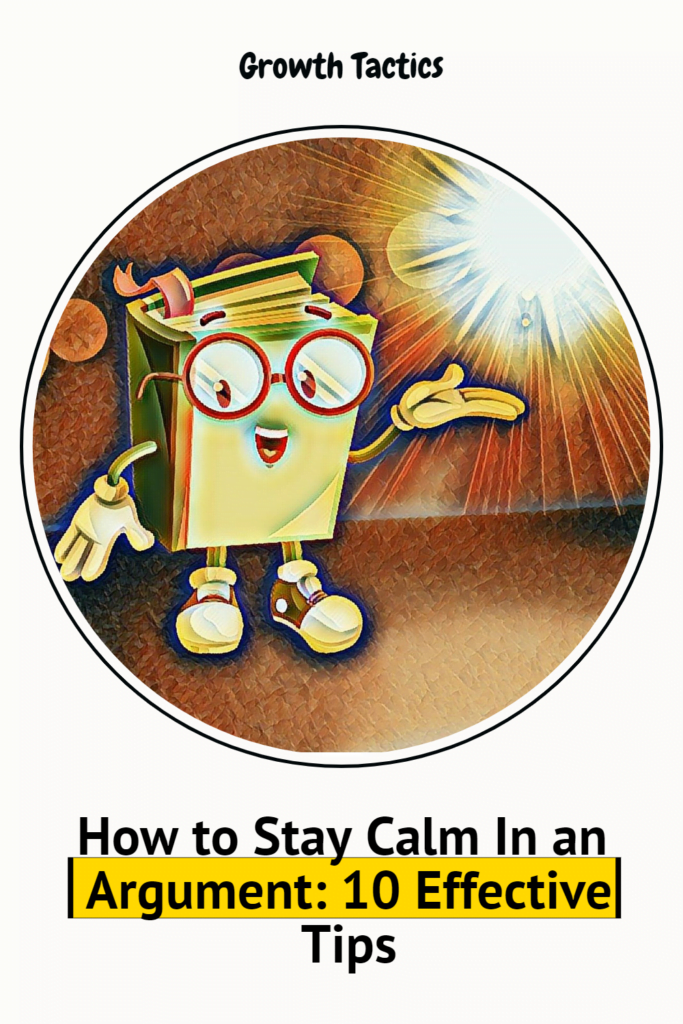Arguments are an inevitable part of life, whether it is at home or work, with friends, family, or strangers. It is natural for people to have clashing opinions and beliefs, and in such situations, disagreements are bound to arise. However, these disagreements can quickly escalate into arguments, which can get heated and cause damage, both mentally and physically. Therefore, it is essential to deal with arguments calmly and stay composed. Here are ten effective tips on how to stay calm in an argument.
Jump To Section
Take a Break
When things get out of hand during an argument, it is important to recognize when it’s time to take a break. Taking a break allows you to step away from the situation and give yourself some space to cool down. It is essential to avoid saying or doing something that you might regret later. By taking some time to collect your thoughts, you can approach the discussion in a more constructive and level-headed way. Whether it is a few minutes or a few hours, taking a break allows you to come back to the conversation with a clear mind and a better chance of finding a resolution.
Breathe Deeply
Anger and frustration can cause your heart rate to increase, leading to a heightened state of arousal. Deep belly breathing can be a powerful tool to help bring down your heart rate and calm your mind during an argument. When you find yourself getting heated and overwhelmed, focus on taking deep breaths in and out, making sure to exhale slowly through your mouth. This breathing technique triggers the relaxation response in your body, helping to decrease your heart rate and promote a sense of calmness. By consciously regulating your breathing, you can better manage your emotions and stay composed during the argument.
Seek Help
When an argument becomes too challenging to handle on your own, it is perfectly acceptable to seek help. Mediation can be immensely beneficial when two parties are unable to resolve their differences. By involving an objective third-party mediator, you can receive guidance and support in finding solutions to the underlying issues that are fueling the argument. A mediator can facilitate a productive and respectful discussion, allowing both sides to be heard and understood. This process often helps the parties see the argument in a more constructive and positive light, leading to a better chance of reaching a resolution that satisfies both parties’ needs.
Validate
When engaged in an argument, it’s crucial to validate the other person’s feelings. Validating someone’s emotions means acknowledging and empathizing with their experience, even if you disagree with their perspective. It shows respect and understanding, creating a safe space for open communication.
To validate someone’s feelings, you can use phrases like, “I understand that you feel upset about this,” or “I can see why you would feel that way.” This approach helps the other person feel heard and acknowledged, which can de-escalate tension and foster a more cooperative atmosphere.
Pause
Taking regular pauses during an argument allows both parties to collect their thoughts, reflect on what has been said, and evaluate their own emotions. When you pause, you can ask yourself questions like, “What are my intentions in this conversation?” or “Am I truly listening to the other person?”
Pausing also helps to avoid impulsivity and knee-jerk reactions. By taking the time to carefully choose your words and respond thoughtfully, you increase the likelihood of a constructive dialogue.
Control Your Emotions
During an argument, it’s normal to experience strong emotions such as anger, frustration, or hurt. However, it’s crucial to manage these emotions in a healthy way. When emotions run high, it becomes challenging to think clearly and communicate effectively.
To control your emotions, practice self-awareness. Recognize when your emotions are becoming overwhelming and take steps to calm yourself down. This can include taking deep breaths, counting to ten, or even excusing yourself temporarily from the discussion to gather your thoughts. By regaining control over your emotions, you can respond more calmly and productively.
Don’t Escalate
Escalating an argument often leads to further conflict and damage to the relationship. Instead of engaging in a tit-for-tat exchange, focus on de-escalation. Avoid using inflammatory language, making personal attacks, or using sarcasm. Instead, stay focused on the main issue at hand and seek common ground.
If the conversation starts to become heated, it may be helpful to suggest taking a break and revisiting the discussion later when emotions have cooled down. Walking away from the argument temporarily can prevent an escalation and give both parties an opportunity to gather their thoughts and approach the conversation with a calmer mindset.
Practice Mindfulness
When having an argument, it’s important to stay present in the moment and focus on the issue at hand. Mindfulness is a way of being fully present, aware of your thoughts and feelings without getting caught up in them. By practicing mindfulness, you can stay centered and calm, reducing emotional reactivity and promoting clearer communication.
One practice to try is to focus on your breath. When you notice that the argument is causing you to feel stressed or overwhelmed, take a few deep breaths and bring your attention back to your breathing. This will help you to stay focused and present and avoid getting carried away by your emotions.
Find Humor
Humor is a great way to defuse a situation that is getting too serious, tense, or angry. Laughter can help you feel better and think more clearly. It can also help you to think more positively and take your mind off the argument. Finding something that makes you laugh can be a useful tool in de-escalating an argument and finding common ground.
However, it’s important to use humor sensitively and avoid making jokes at the expense of the other person. If you’re not sure whether a joke will be appropriate, it’s best to err on the side of caution and avoid it.
Avoid Personal Attacks
Personal attacks can be very hurtful and escalate the conflict further. It’s essential to stay focused on the issue at hand and refrain from attacking the other person personally. Stick to discussing the problem and finding a solution together. This approach shows that you respect the other person’s feelings and positions and paves the way for a more constructive conversation.
If you feel like you’re getting too upset or angry, it’s okay to take a break and come back to the conversation when you’re feeling more centered. Remember that the goal is to find a solution together, not to ‘win’ the argument or make the other person feel small.
Certainly! Here’s an article section with headers on what causes us to lose control during arguments:
Understanding the Triggers: What Causes Us to Lose Control During Arguments
Arguments can be emotionally charged situations that push us to our limits. It’s not uncommon to find ourselves saying things we don’t mean or reacting in ways that we later regret. Understanding the triggers that cause us to lose control during arguments is essential for improving our ability to manage conflicts constructively. Let’s explore some common causes:
1. Emotional Triggers
Our emotions can be powerful triggers during arguments. When we feel attacked, invalidated, or unheard, it can ignite a strong emotional response. Anger, frustration, and hurt can overwhelm us, leading to impulsive reactions and a loss of control.
2. Unresolved Past Issues
Arguments often bring up unresolved past issues and emotional baggage. When the current conflict triggers old wounds, it can intensify our emotional response. We may find ourselves reacting not only to the present situation but also to the accumulated frustration and unresolved issues from the past.
3. Lack of Effective Communication Skills
The inability to communicate effectively during arguments can contribute to losing control. When we struggle to express ourselves clearly, misunderstandings can arise, leading to frustration and further exacerbating the conflict. Poor communication skills can make it challenging to listen actively, understand the other person’s perspective, and find common ground.
4. Ego and Defensiveness
Our ego plays a significant role in how we handle arguments. When we feel personally attacked or criticized, our instinct for self-preservation kicks in, and we become defensive. The need to protect our ego can cloud our judgment, resulting in reactionary behaviors and an escalation of the conflict.
5. Power Struggles and Competition
Some arguments can become power struggles or competitions, where the focus shifts from finding a resolution to proving oneself right or gaining control. When winning becomes the primary objective, it becomes easy to lose sight of the original issue and instead fuel the fire of conflict.
6. Lack of Emotional Regulation Skills
Arguing requires emotional regulation, the ability to manage and control our emotions effectively. When we lack these skills, small triggers can quickly escalate into intense emotional outbursts. Without the ability to regulate our emotions, it’s challenging to maintain composure and engage in productive communication during arguments.
Understanding these triggers can help us become more self-aware and make conscious efforts to manage our reactions effectively. By developing strong emotional regulation skills, improving communication techniques, and approaching arguments with empathy and understanding, we can navigate conflicts more constructively and preserve our relationships.
Conclusion
In conclusion, staying calm during an argument is not easy, but it is fundamental to finding a resolution. Deep breathing, taking a break, finding humor, and seeking help are some of the effective ways to stay calm during an argument.
Keeping your cool, controlling your emotions, and avoiding escalation are essential tools in de-escalating a situation. Finally, validating the other person’s feelings and pausing to assess your response will help in finding common ground and reaching a meaningful resolution. Remembering these tips can help avoid regrets later and maintain good relationships with those around you.


